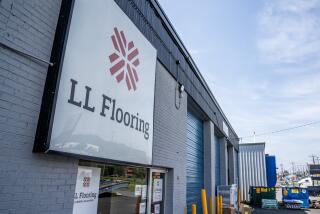Family Is Forced to Sell a Long-Time Institution in the Valley
- Share via
One of the San Fernando Valley’s biggest and oldest lumber dealers will end 50 years of family ownership in January when Tarzana-based Terry Cos. is sold to Carolina Holdings of Raleigh, N.C., one of the nation’s largest suppliers of lumber and building materials to contractors.
Sales of family owned lumberyards are nothing new as ever-expanding home improvement chains swallow companies too small to compete. But that’s not the case with Terry, according to founder Terry Mullin.
Mullin, 78, said the company’s sale was precipitated by the death in July of his son Tom, 42, former president and “the dominant force in our company for the past 10 years,” after a six-year battle with cancer.
Mullin, who founded the company in 1949 with a $6,000 investment and who estimates sales at $300 million for 1999, said the firm never had a money-losing year, was doing well, was free of long-term debt and would have continued under Tom Mullin’s stewardship if it had not been for his death.
“We had done quite a bit of family planning to determine the direction of the company, but Tom’s passing tossed a lot of that out the window for us,” Mullin said.
Under its new ownership, Mullin said, Terry will continue to be headed by current president Lonnie R. Schield Jr., a former builder and longtime Los Angeles area framing contractor who became president of the firm in 1997, when Tom Mullin stepped down for health reasons.
Mullin expects Carolina Holdings to continue to expand Terry, which includes 14 lumberyards and 12 other locations employing 750 workers, 228 of them in the San Fernando Valley.
Carolina Holdings does not comment on pending acquisitions, said its president and CEO, Fenton Hord.
But in general terms, he said, the company’s “history has been to buy good regional companies that are contractor-oriented and allow those companies to grow.”
“What we contribute is the capital to grow, along with systems and processes that will only enhance what they are already doing,” he said.
Acquiring Terry will be the first venture into California for Carolina Holdings, which industry sources list as the country’s largest supplier of lumber and building materials to professional contractors, with about $1.5 billion in 1998 sales.
“My guess is that they [Carolina Holdings] are not getting into the California market just to remain static,” said analyst Wayne L. Hood of Prudential Securities. “I would expect that they believe they can grow the business.”
Hood said companies like Terry and Carolina Holdings, which cater to professional contractors known as the “pro market,” thus far have faced relatively little competition from the huge home improvement chains like Home Depot because the latter focuses more on the homeowner market.
Home Depot is trying to gain a larger portion of the $71-billion pro market, Hood said, but he said the retail giant is focusing on “smaller contractors that would spend about $200,000 per year” rather than larger accounts. Most of the pro market is still the domain of myriad independent firms, Hood said.
*
Mullin said he focused on professional contractors from the day he founded his company in December 1949 by acquiring a 60% interest in a lumber firm that his father, Russell, owned in partnership with a brother.
Mullin, who bought the remainder of the company a few years later, landed in the lumber business through “strange circumstances and a quirk of fate,” he said.
A Burbank native and World War II Navy veteran, Mullin had a Stanford University degree in economics. He had never worked in the lumber business and knew nothing about it.
He was helping Pan American World Airways establish its Australian operations in 1949 when he was called back to L.A. to manage some business affairs for his father, who had suffered a heart attack.
One of Mullin’s tasks was to sell the family lumberyard.
“Get rid of that lumberyard,” Mullin’s father told him. The request made sense because the lumberyard was consistently losing money, Mullin recalls.
“Off to Tarzana I went, but I didn’t even know how to dispose of the business. By the time I learned anything about it, I got interested in the lumber business and decided to stay with it,” Mullin said.
Terry, which posted sales of about $100,000 its first year, has been ranked among the top 20 or 30 pro market lumber dealers through the years by various trade publications. The company was initially called Terry Lumber, but was renamed Terry Cos. later to reflect its expansion into related businesses.
Besides its original yard in Tarzana, the company has locations in Burbank, Glendale, North Hollywood, Northridge, Sun Valley, Lancaster, Palmdale, Santa Clarita Valley, Simi Valley, Ventura, Camarillo, Hollywood, Los Angeles, Bakersfield and Riverside County.
In addition to lumberyards, its operations include a planing mill and manufacturing facilities making roof trusses, window sashes and doors under several other names, including Precision Mill & Lumber and Inland Timber Co.
Despite the rise of home improvement chains, Mullin said Terry’s main competition has been local lumberyards, many of which have gone out of business or been acquired by other firms, including his own.
“When I got into the business, there were lots of very small lumber companies in the San Fernando Valley, but they have disappeared throughout the years, and they’re continuing to disappear throughout the country. It’s the same thing that’s happening in so many other industries,” Mullin said.
Companies like Terry serve professional contractors who require “a type and level of service that not every yard can provide,” said Darrell Allen of Allen of Allen Construction Inc., a Westlake Village-based framing contractor.
Allen said he has gone to Terry Lumber for every job except one since founding his company in 1982. He tried a different lumberyard for his first job, but was disappointed with the service and turned to Terry. He has stuck with the Tarzana company ever since.
According to Allen, it boils down to service. Contractors have two basic options in buying lumber, he noted: Buy it in bulk and cut it to size themselves, or order it cut to order from the yard.
When he orders lumber, Allen said, he requires that it be a certain quality and cut to certain size specifications, stacked a certain way and delivered on trucks carrying specific loads assigned to specific parts of a job.
For example, Allen is working on a 13-home development where “every load that comes off of every truck is earmarked for not just one house, but one room of one house,” with each piece of every load cut to order.
If a builder over-orders or has a problem with some lumber, Terry “is big enough and strong enough to take some lumber back and credit you for it, but the smaller yards can’t afford to do that,” Allen added. ‘You’d be surprised how few lumberyards there are in the L.A. area that are large enough to handle this construction boom we’re in.”
Another Terry customer and a former employee of the company, estimator David Lopp of framing contractor Leonine Construction in Ventura, said the company has managed to keep a “small lumberyard feel” to its operations despite its size.
Framing contractors often get little notice that a builder wants them to start on a job within a week or less, meaning they need to have complex lumber orders filled and delivered quickly, sometimes on the same day, when a builder issues change orders in the field.
Like Allen, Lopp emphasized the importance of dealing with a yard that can “pre-cut all of our material” so that “when we get a lumber delivery out on the job, we can just spread the lumber and nail everything together.”
Mullin doubts that he could repeat what he did if he started in the lumber business today because it’s getting harder all the time for small companies to compete against the building supply behemoths.
Terry is “by no means a small company” today, but the trend in the industry is to ever-larger operations, said Rick Schumacher, editor of Building Material Dealer magazine.
Terry Cos. was large enough to compete in today’s market, Mullin said, but he said that during his son’s battle with cancer the family--which includes another son, Russell, and a daughter, Reilly--decided the company’s best hope lay in selling out to a large lumber concern.
“We were concerned that if anything happened to me, the company probably would have to be sold to pay taxes, and it would be sold by a group of attorneys and bankers who wouldn’t know anything about the lumber business or care about our employees,” Mullin explained.
“I don’t enjoy selling the business,” Mullin said, “but this way, the company will go on, and the employees who have put their lives into this company will have an even better opportunity to grow than we could give them.”
More to Read
Inside the business of entertainment
The Wide Shot brings you news, analysis and insights on everything from streaming wars to production — and what it all means for the future.
You may occasionally receive promotional content from the Los Angeles Times.










